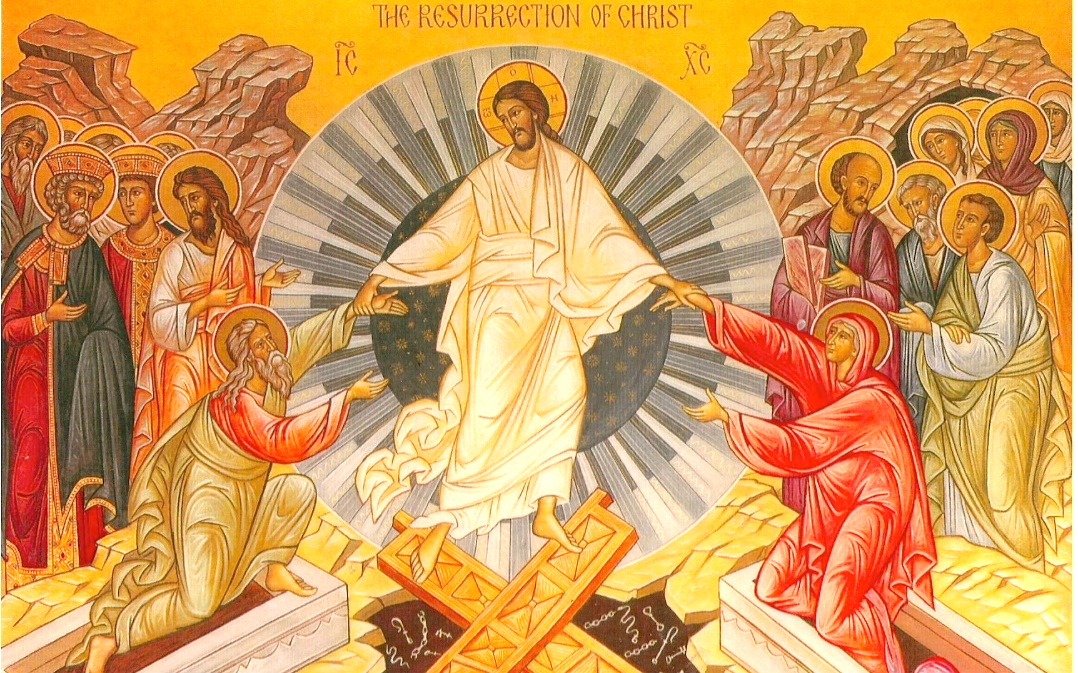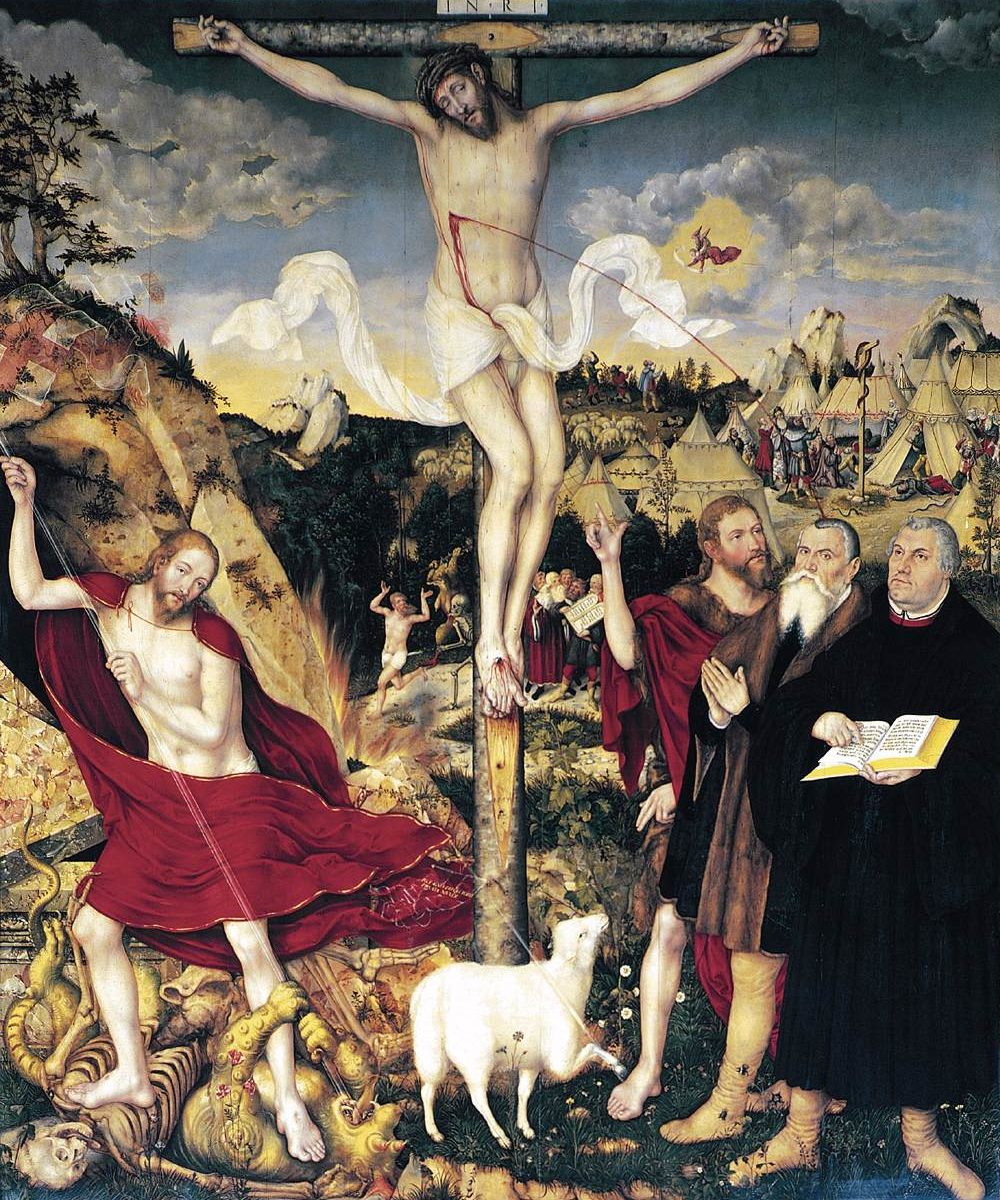Bethlehem Lutheran Church, Lebanon, OR
Feast of St. Michael and All Angels – September 29, 2019
Text: Revelation 12:7-12
We often thank God for the dedicated service of the members of the armed forces. We thank Him for giving these men and women such dedication to their country and its citizens. That peace we enjoy in our nation as a result of their service is something we should rightly be thankful for and never take for granted.
While as Americans, we do enjoy liberty day to day, there is another nation with which we are familiar because we are also citizens of it. That nation is the Christian Church. God calls us a holy nation, a people for His own possession [1 Pet. 2:9]. This nation also has an army—although its service is mostly unseen. There are those dedicated soldiers who work tirelessly to defend the citizens of God’s nation—the army of God’s angels. Today, on this Feast of St. Michael and All Angels, we remember the faithful service of these angels to us.
But we might ask, What does the God of Peace need with an army? The very fact that the angels are God’s army means that there is an enemy to be fought and defeated. This is what we learned from the 2nd reading, from Revelation 12:
“Now war arose in heaven, Michael and his angels fighting against the dragon. And the dragon and his angels fought back, but he was defeated, and there was no longer any place for them in heaven. And the great dragon was thrown down, that ancient serpent, who is called the devil and Satan, the deceiver of the whole world—he was thrown down to the earth, and his angels were thrown down with him.” (vv. 7-9)
This war is between powers in the heavens, between the angels of God and the angels who follow Satan, who we know as the demons. Satan and his demons are determined to destroy God’s people, as they have been since the beginning of creation. This is the true battle between good and evil: It isn’t between warring political parties, social ideologies, or nuclear powers. It is a war between the Creator of heaven and earth, and a rebellious faction of His servants who threaten the crown of His creation—mankind. The stakes are not merely the rise and fall of an earthly nation, but the difference between an eternity in hell for us or God’s goal of bringing us into eternal fellowship with Him.
The battle lines are drawn upon the salvation of sinful men and women. For this, immortal creatures clash as Satan and his army vies for dominance. As the prophet Isaiah alluded to, “How you are fallen from heaven, O Day Star, son of Dawn! How you are cut down to the ground, you who laid the nations low! You said in your heart, ‘I will ascend to heaven; above the stars of God I will set my throne on high; I will sit on the mount of assembly in the far reaches of the north; I will ascend above the heights of the clouds; I will make myself like the Most High.’” (Isaiah 14:12-14). Satan desired the glory that belongs only to God Himself. He wants man to worship and serve him. He wants the majesty of God to be his own, though he is not God. Then, he planted that same deceit in the heart of Eve, and then Adam. How he rejoiced when we became convinced of our own ability to become like God, judging for ourselves what was good and what was evil.
But God would not let such a victory be had. He would not let His glory be given to another [Isa. 48:11]. So, He swore to trample that serpent, to crush his uplifted head, and to unravel the corruption Satan had incited in man. And because God swears to do it, no creature—not even the most powerful of angels—can overturn God plans.
That plan of God was carried out with the birth of a “male child” (Rev. 12:5). Yet this male child was no ordinary son of Adam. He was not simply another human, conceived in sin and ripe for deception and accusation. No, this was the One who would turn the battle in favor of God and the salvation of man. From the beginning, the angels of God have had a heavenly, eternal commander-in-chief: known as the Angel of the Lord and the Lord of Sabaoth. “Sabaoth” is Hebrew for armies, as we sing in the Sanctus—“Holy, holy, holy, is the Lord God of Sabaoth.” He is the Lord of God’s Army. This One entered the battle Himself when He became man and was born that male child.
In this way the battle was swayed in our favor, because the commander of the Lord’s Army, God’s Son Himself, fought for us by taking up our cause in the flesh. He entered the fray with His almighty power, at which the demons cried out: “I know who you are! You are the Holy One of God” (Mark 1:24) and they cringed at His presence. No enemy can withstand His power, because He commands even the angels who have rebelled against Him.
Yet it wasn’t only with His might that He fought for us. His most effective weapon against Satan and the demonic host is His human flesh. Satan and his army had brought corruption and death to the sons of Adam. All their flesh had followed in the image of Satan, so that there was none righteous, no not one and all had turned aside to this angel posing as God [Ps. 14:1]. Then came the Lord of Hosts in the same flesh—yet without sin. The Accuser had nothing to accuse, and try as he might, he could not tempt and deceive this Second Adam [Matt. 4:1-11]. Yet Jesus bore these accusations on behalf of man. He bore the punishments in our place. The Lord of Sabaoth died in lowly grief and shame. And on the Third Day, this same Lord rose victorious over Satan’s greatest weapons against man—sin and death.
Because of this victory, the song rings out in heaven, “Now the salvation and the power and the kingdom of our God and the authority of his Christ have come, for the accuser of our brothers has been thrown down, who accuses them day and night before our God. And they have conquered him by the blood of the Lamb and by the word of their testimony, for they loved not their lives even unto death” (Rev. 12:10-11). This is the victory which guarantees the success of every battle fought until the Last Day. The commander of the Lord’s army Himself has won in the fight, laying down His life for man and taking it up again [Jn. 10:18].
This battle continues, as it says, “Woe to you, O earth and see, for the devil has come down to you in great wrath because he knows that his time is short!” (12:12). For this reason, the angels of God still fight the devil and his angels. The battle is far greater than any human being could win. The proud devil has been thrown out of heaven, and instead, we have been promised a place there. But he will not rest until he is cast into hell on the Last Day.
We have heard it in so many Gospel accounts of demon possession, yet we see it in our own day how the devil has deceived a whole generation into only watching out for visible dangers. The Prince of Lies has convinced the masses that stories of angels and demons were invented by primitive people who had no better way to explain the world around them. But this plays into his power over us. As true as the rest of God’s Word, Satan and his demons are a very real threat. But even more so, the angels of God are a very real help against these enemies!
Satan’s wrath is great against God and against those who belong to Him. Ever wonder why unbelievers have it so easy? It’s because Satan and his demons aren’t fighting against them. They are right where Satan wants them—lost in unbelief. But we belong to God. He redeemed us out of the devil’s house with the blood of His only-begotten Son. Through the waters of Holy Baptism, God brought us into His Kingdom. But Satan always wants us back. He fights to regain us as hard as he can, and he’s got a third of the angels fighting with him.
All armies seek the defeat of their enemies, but the devil’s army fights for the damnation of every human being. It is against this kind of army that God and His holy angels fight. And, unlike earthly battles, what’s at stake isn’t land or power over people. As I said before, the outcome here is the difference between eternal life or eternal death. In the Gospel, Jesus says, “Nevertheless, do not rejoice in this, that the spirits are subject to you, but rejoice that your names are written in heaven” (v. 20). This shows us what the Lord and His hosts fight for. He isn’t out to defeat Satan just to show that he’s more powerful. It’s not a war for the sake of bragging rights. The Lord is seeking the salvation of all people. Our boast is in the Lord, not only because He is mighty, but because He is mighty to save us in body and soul forever.
So, it’s for you and me that God’s angels fight. The Lord Jesus Himself commands these forces to defend us against the devil’s attacks, whether these attacks come to our bodies or our souls. Satan tries to destroy our souls by fillings us with doubts and telling us lies about God. Demons cannot dwell alongside the Holy Spirit in believers, but they certainly come pounding on the door. But God sends His angels to defend us against these attacks. As Psalm 91 says, “He will command His angels concerning you, to guard you in all your ways. On their hands they will bear you up, lest you strike your foot against a stone” (Ps. 91:11-12). They guard your path, so that you can stay on the narrow path which leads to life [Mt. 7:14].
But the devil also seeks the harm of our bodies because he wants to catch us off-guard. In one of the ancient prayers of the Church, God’s people pray for deliverance from “sudden and evil death.” A sudden and evil death is one where we are caught at a time when we’ve been lazy in defending against satanic attacks and perhaps we’ve even hung the Armor of God up in the closet. But even in these times of blindsided attacks, the Lord sends His angels to watch out for us. We may or may not know what’s happening, but the help is still there.
The Lord of Hosts and His angels are a great army, always watching out for us. They fight for us, against an enemy far stronger than any human being. They fight for God’s people, always keeping vigil for our safety. They carry out God’s commands with swiftness, accuracy, and without question. All this they do because of the incredible love of God in Christ Jesus. Though they already see God face-to-face, they gladly leave His presence to come to our aid. This they do for us, so that we too can behold Him face-to-face when we will arise in the glorious resurrection. Through the labors of the holy angels, you and I will enjoy that peace which never ends. Thank our God and Savior for the faithful service of His holy angels! Amen.






